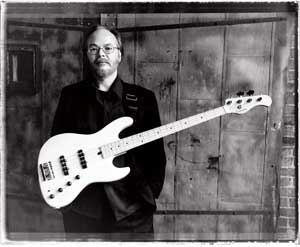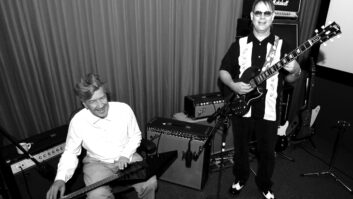
Walter Becker
Walter Becker and Donald Fagen have been on the road all summer leading Steely Dan through its paces, drawing enthusiastic crowds to their Think Fast tour. Meanwhile, Becker has a little side treat for us: His second solo album, Circus Money, thrills with exquisite musicianship and just the right touch of Dan — darkish and naughty in spots. The spirits of Jamaica haunt many of the tunes — sometimes in the daylight, more often dancing in the shadows. As you’d expect, it’s eclectic, rhythmic, clever, and laid-back in a good way. We caught up with Becker before the tour.
When did you start working on this new album?
We started recording it almost two years ago, and [producer] Larry Klein and I started writing it about a year before that. I had a bunch of different ideas about what I could do based on Jamaican-style music, with a kind of reggae rhythm section, or rock steady, or whatever you want to call it.
I was wallowing in a deep research phase of listening to this kind of music, and making some sketches and trying to figure out how I wanted to approach it. At that point, Larry came to me, and he said, ‘Why don’t we make a record?’ He said he would produce it and we started writing together. In some cases, we started from scratch, or we’d cop a tempo and a feel off this or that Jamaican record. We’d get a basic tempo and a rhythm pattern for the bass.
Larry is a bass player, like you. It’s two bass players ganging up on Jamaican music. There is such fine musicianship and an incredible groove on this album. It makes you want to get up and move your spine around.
Well, that is a much-strived-for effect. The way it worked out, there are ways in which I would use elements or principles from Jamaican music and I would apply them to things that didn’t sound particularly Jamaican. For example, “Downtown Canon” doesn’t sound like a reggae song — or maybe it does.
Some of the songs are rather bass-heavy, and I love it. In some cases when the song starts out, it sounds like the bass is the lead instrument, as in “Bob Is Not Your Uncle Anymore.”
It is, that being one of the more overtly reggae-sounding tracks. In reggae music, the groove is defined as much by the bass part as by the chord changes. If you listen to American soul music, the drummer is laying down a pretty steady beat. The bass player may be blowing around that, a lá Motown records or soul and funk records. The bass is still very, very important to the whole thing, but it functions in a different role. In Jamaican music, the roles are reversed. The bass player lays down the repetitive part and the drummer can blow around that a little bit.
For some of these songs, in order for them to make sense we had to have that density in the bass to build the tune around. It’s almost like the bass part is like a Big Band riff that you build the tune around, you know?
How long did tracking take?
Ten or 11 days.
Didn’t Steely Dan use to take years making an album?
Well, Steely Dan could afford to take years. Also, with Donald and me both there, getting something that met both of our expectations became doubly hard. For this record, everybody had heard all the songs beforehand and everyone had charts. Also, I had made little MIDI demos that I later put vocals on.
You recorded in New York City, right?
We recorded and did some overdubs at Avatar in New York, and then did overdubs at Larry’s studio in California.
It’s interesting that you were recording around the same time, with the same engineer, as when Larry was producing Herbie Hancock’s Album of the Year, The Joni Letters.
Yes, Helik Hadar is a very good engineer. The original tracking dates for my album were done by Elliot Scheiner for six days and Jay Messina for five. I started on impulse and booked those tracking sessions in New York.
It’s been 14 years since your first solo album, 11 Tracks of Whack. Did you plot out this hiatus ahead of time?
Certainly not. After I did that album, we started working on Steely Dan records and tours.
Yes, and what a pleasant surprise that you guys came back and took over again!
Well, it seems to me that the careers we have been fortunate enough to have, have been such unlikely ones in so many ways. We were able to get a fairly unusual kind of music played in the first place, and stick with it and keep doing it without worrying about whether our audience would follow along with us wherever we went through the ’70s. We essentially stopped through the ’80s, and then picked it up again in the ’90s. As it turned out, the ’80s was no decade for guys like us anyway.







